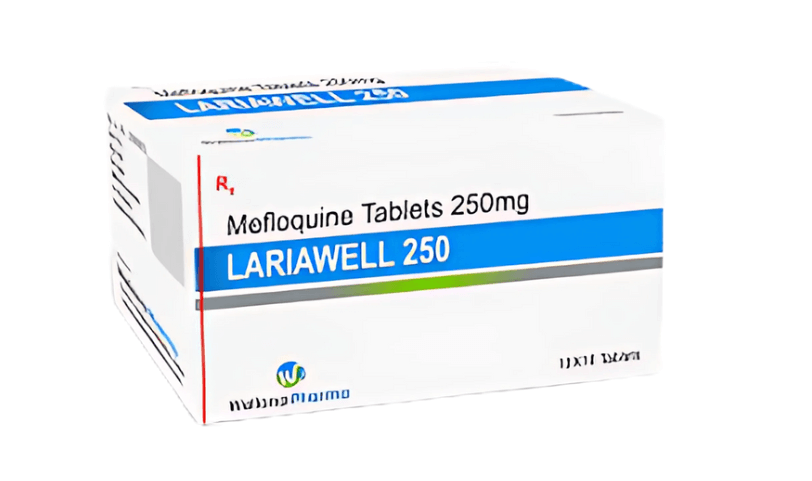Lariam/Mefloquine (generic name: mefloquine) is an antimalarial medication used for both
the prevention and treatment of malaria, particularly infections caused by
Plasmodium falciparum and
Plasmodium vivax. As a member of the
quinoline-methanol pharmacological class,
mefloquine interferes with the parasite’s ability to metabolize and utilize erythrocyte hemoglobin, leading to its death. This mechanism makes it
effective against malaria strains resistant to other treatments. Mefloquine is typically administered orally and is known for its long half-life, which supports once-weekly dosing for prophylaxis. For more information, refer to the
Centers for Disease Control and Prevention’s page on mefloquine.
Dosage
For
malaria prevention, the standard adult dosage of mefloquine is 250 mg taken once weekly. It is recommended to start the medication at least one week before entering a malaria-endemic area, continue weekly during the stay, and for four weeks after leaving. For
treatment of mild to moderate malaria, a single dose of 1,250 mg (five 250 mg tablets) is commonly prescribed. If a dose is missed, it should be taken as soon as remembered unless it is close to the time for the next dose; in such cases, skip the missed dose and resume the regular schedule. It is not advisable to double-dose.
Storage
Mefloquine tablets should be stored at room temperature, between 15°-30°C (59°-86°F). They should be kept in a tightly closed container, away from moisture and direct light. Refrigeration or freezing is not necessary. Always check the expiration date and dispose of unused or expired medication properly.
For more information, read our article on drug storage.
Common Questions About Mefloquine
How should Lariam be taken for malaria prevention?
For prevention, Lariam is taken once weekly, starting at least one week before entering a malaria-endemic area, continuing during the stay, and for four weeks after leaving. It should be taken with food and a full glass of water.
What is the quinoline-methanol class of drugs?
Quinoline-methanol drugs, including mefloquine, are antimalarials that disrupt the metabolic processes of malaria parasites, making them effective for both prevention and treatment.
What is malaria, and how is it transmitted?
Malaria is a parasitic infection transmitted by the bite of an infected
Anopheles mosquito. Symptoms include fever, chills, and fatigue, which can progress to severe complications without treatment.
How does mefloquine work?
Mefloquine disrupts the malaria parasite’s ability to metabolize hemoglobin, which is essential for its survival. This action ultimately leads to the parasite’s death.
This text is for informational purposes only. Please consult a doctor or pharmacist before using any medication.
Read the information leaflet that comes with the medication.
If a sudden allergic reaction (anaphylaxis) occurs after taking Lariam, with symptoms like swelling of the face, tongue, or throat making it difficult to breathe or swallow, or there is wheezing, hives, rash, blistering, or peeling of the skin, call a doctor or 911 right away, or go to an emergency room immediately.
Most people who use Lariam do not experience any adverse side effects. Doctors prescribe this medication because they assess the benefits of such treatment outweigh any likely unwanted effects.
Some of the side effects that have been reported include nausea, vomiting, diarrhea, dizziness, and vivid dreams. Serious side effects may involve neuropsychiatric reactions such as anxiety, depression, hallucinations, and, in rare cases, suicidal thoughts. If any of these side effects occur, stop taking the medication and consult with a healthcare provider as soon as possible.
Not all side effects are listed here. If these or other unlisted symptoms persist or worsen, consult a healthcare provider or pharmacist.
Mefloquine is FDA-approved for the treatment and prevention of malaria caused by Plasmodium falciparum and Plasmodium vivax, including strains resistant to chloroquine. Malaria symptoms typically include fever, chills, headache, muscle aches, and fatigue. In some cases, nausea, vomiting, and diarrhea may occur. Prompt treatment is crucial to prevent complications such as anemia, jaundice, seizures, and, in severe cases, death. Mefloquine is primarily used for malaria, and it is not commonly prescribed for other conditions.













